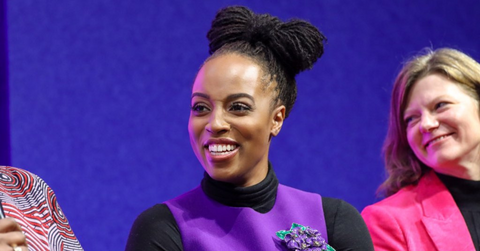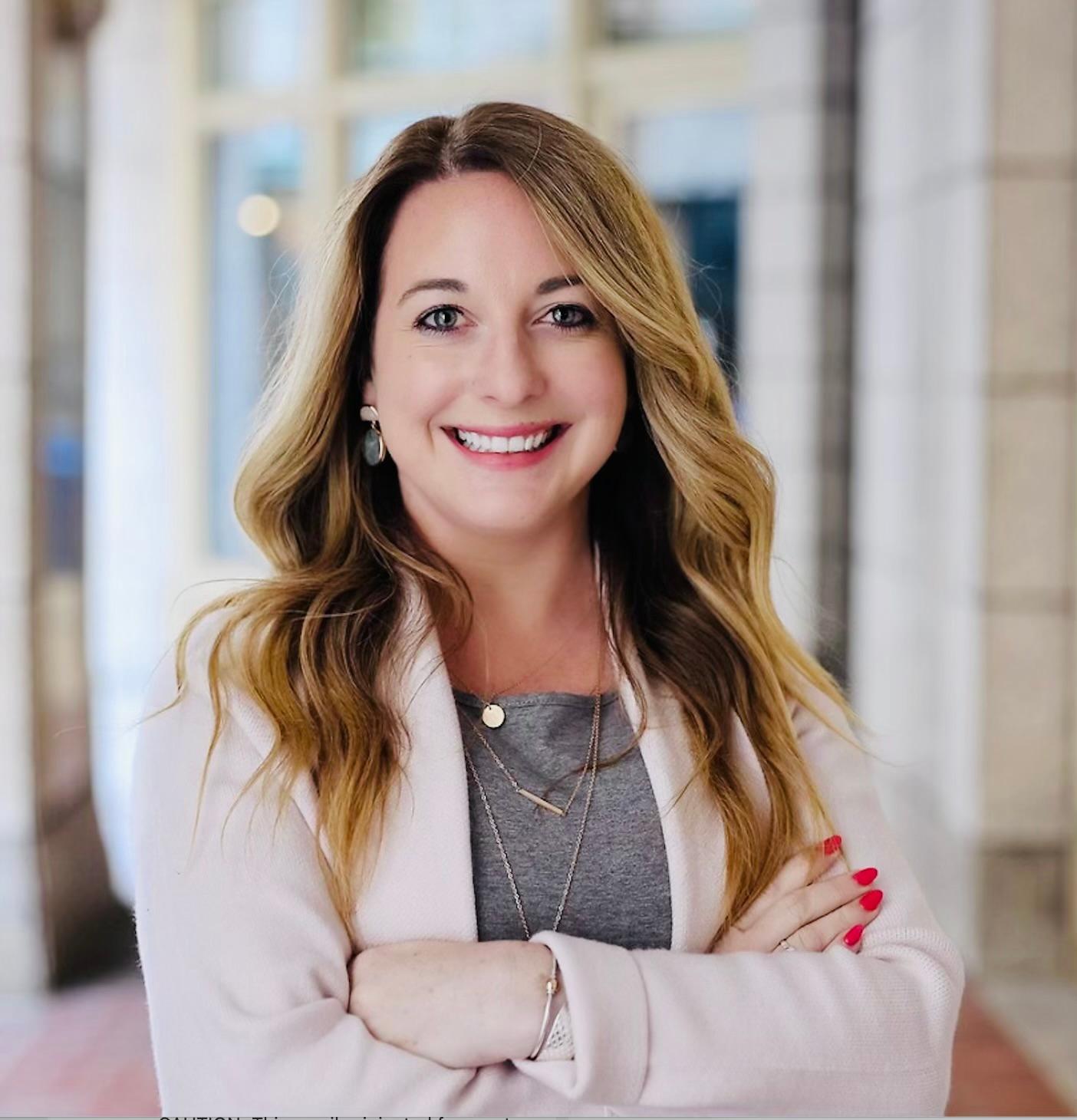As the founding executive director of NYC Her Future, Nathifa Forde is rooted in community. For the past year, she has led groundbreaking efforts to uplift young women and girls of color across New York City through “learn and earn” opportunities that provide them access to non-traditional employment opportunities and reinforced efforts to educate young women and men about issues that impact them today and will impact them in the future.
Despite the success of NYC Her Future in supporting local programs across the city, Nathifa recognizes that there is more work to be done. For her, this work is not lighthearted – much of her work is spent acknowledging the journeys of those who brought young people to the city and rewriting the challenging stories that young women have faced for generations.
Throughout her career, Nathifa has found support and mentorship from the women around her, and as she reflects on her first year in this role at this newly created office, she reminds young women that they don’t need to do it alone.
Her Agenda: Your career has been so rooted in advocacy and equity. What inspired you to take on this work, and what led you to where you are today?
Nathifa Forde: I started off as a teaching artist, teaching dance and theater, and all of those wonderful things to young people, and sharing my passion and my joy for the arts with them. From that, I realized the impact of bringing community together and being grounded in community. We put on full-scale productions such as “The Wiz” and “Malcolm X,” and let young people share their interpretation of different stories as it relates to biblical stories or historical stories. [That] is the piece that really kind of opened up social justice [to me] – giving them an outlet to speak about what they’re going through in their lives and what they’re experiencing. But one of the things that I didn’t anticipate in that space is how involved the community would be. Our community members showed up: parents, grandparents, uncles, and aunties. I mean, people coming in [saying] ‘I want to do makeup,’ ‘I can donate tap shoes,’ ‘I can do those things.’ So for me, this work really kind of started off with me sharing my passion for the arts with young people, but also understanding how pivotal and crucial community is [for] doing that.
When I say I’m grounded, I’m rooted in community. I’m grounded and rooted in those communities that have given me everything in my career, and, most importantly, those communities that I come from. So this work for me is not lighthearted. It’s not work that I just get up and go, I’m just going to a job. I see all those faces. I remember all those young people when they see me, their moms, their dads.
This journey started in community and doing the thing that I love, and at this juncture in my career, through many different avenues that I’ve been able to really navigate through. I’m still enjoying the work. [It] definitely has parts that are hard, that are difficult, because these issues that we seek to address are not lighthearted, but it’s the work that I enjoy.. You cannot touch the lives of young people until you understand the homes and the households, and the cultures that they come from. So culture is such a big part of the fabric of New York City, and it’s such a big part of [what] we’re building [with] our programs at NYC Her Future. We are grounded in understanding that everybody has a cultural identity that needs to flourish, that they should be proud of, that they are part of, and that’s a part of them. That will forever be a part of them, and how they see the world, how they navigate the world. So while we’re talking to some communities culturally, it may not be the same conversation, or we may have to approach it from a different lens, and I think that is the piece of being a New Yorker that is beautiful.
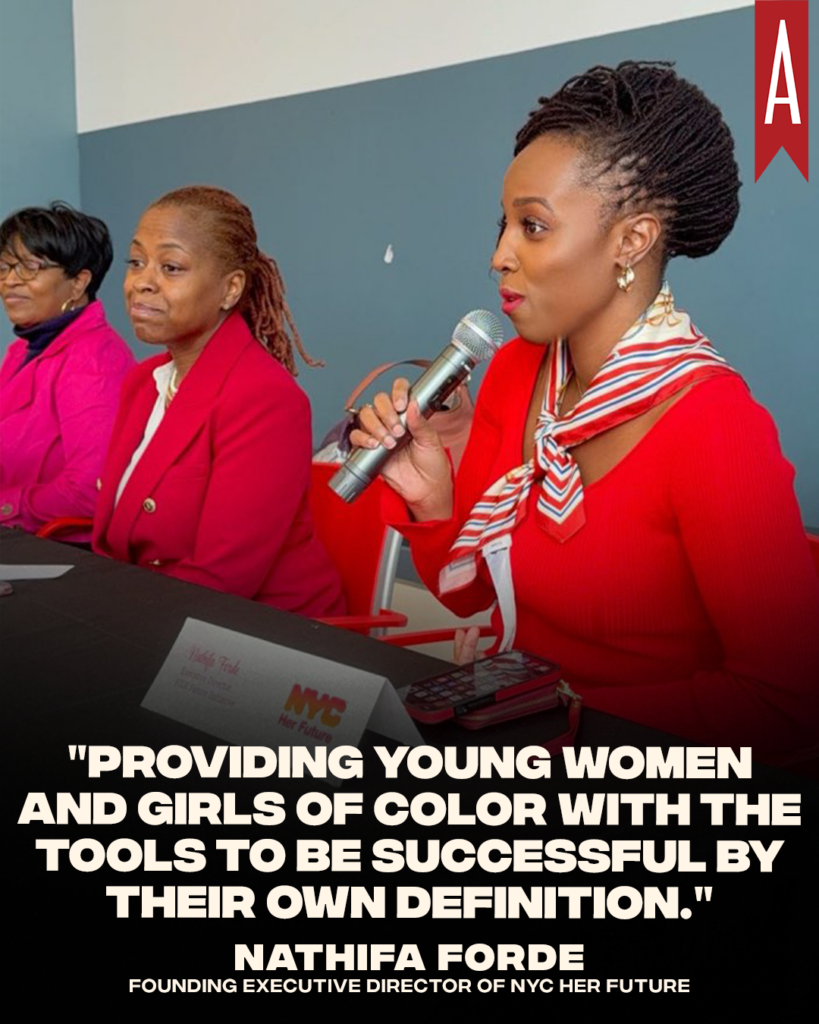
Her Agenda:You previously served as Acting Executive Director at the NYC Young Men’s Initiative. How did that experience shape your current work?
Nathifa Forde: At the New York City Young Men’s Initiative, my task was to build out the team, and I’m proud to say we had a very strong and capable team. [We were also tasked with] expanding our healthcare initiatives and increasing our evaluations to make sure that we were really measuring our programs for impact. [That included] understanding that these are sound investments that we were making, and looking at our educational portfolio and making sure that they had strong programs that would be lasting. That’s work that I’m proud of.
[For example], I had the opportunity to build out a doula program. And people always go, ‘Why would young men be interested in doulas?’ And I always would say that our communities are not built on singularity. They’re not built on gender. [It] doesn’t matter how you identify, you make up the fabric of a community. So when we’re talking about young men across New York City, Black and brown young men, we have to understand that they are raised by mothers. They are raised by fathers, they are raised by aunties. They are raised by grandmothers, grandfathers. And it’s all these different people who have an input in their life. And I would always tell people that we cannot talk about the lives of Black and brown boys until we talk about the wombs that are birthing them. If you’re telling me that people do not care about this, if you’re telling me that the services and the opportunities for these young boys are bleak, then we have to start at the first initial stage, and it is the wombs that are birthing them.
The data shows that women of color, and Black women specifically, [are] dying at higher rates. And that’s something for us to really understand, because these are the wombs that are birthing a nation. If we understand those things, then we’ll begin to really address the disparities, because we have to start caring not just when they enter school, but we have to begin to care from infancy and from when they’re in the womb. I think that shifted the conversation to talk about it not as a woman’s problem, but as a community problem. My work at YMI kind of set the tone for this work, and it gave me the opportunity to understand what is needed from a gender-specific lens.
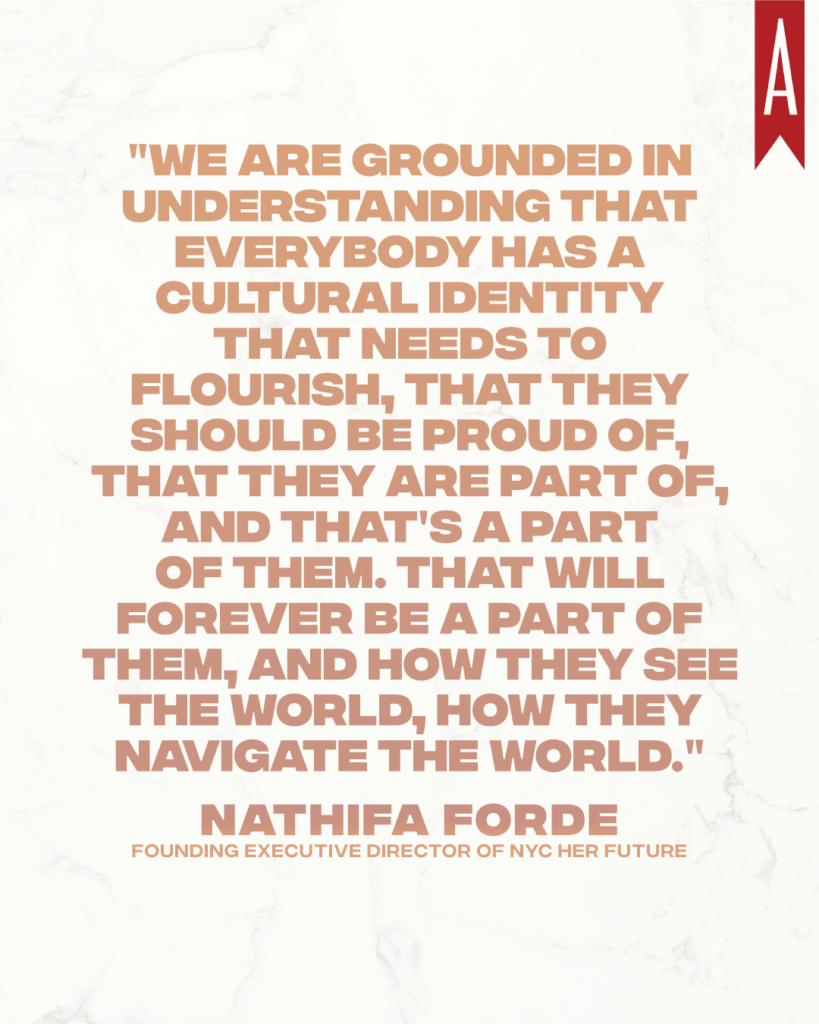
Her Agenda: NYC Her Future is celebrating its one-year anniversary. What does this milestone mean to you?
Nathifa Forde: I always tell people there we are literally standing on the shoulders of our ancestors, of our moms, of our parents, all of the folks who have gone the mile before us. I think it’s important that we understand that even though these are her stories, they won’t be our stories. New York City is a city that has a lot of people who came here from many different parts of the world, right? My great-grandparents came here from Barbados and Cuba. My grandmother, on my maternal side, came here from Trinidad. I’m not first generation, but I do understand the cultures that I come from and that have played a part in creating who I am.
As I think about NYC Her Future, I am excited for the work that we’ve been able to do. We’ve been able to support our CUNY students in participating in certification programs that will allow them to learn and earn at the same time in the healthcare space. We’ve been an investor of the My Sister’s Keeper program for quite some time. This is work that I invested in at my time at YMI and now here at NYC Her Future. So it’s not just my brother’s keeper, it’s my Brother and My Sister’s Keeper, and we also have the opportunity to really think about different programs that we’re building out with the Administration of Childcare Services. Most importantly, getting our young people out and about to experience new things. We’re creating opportunities for our young women to have access to spaces that sometimes they wouldn’t have had access to. It doesn’t always have to be super intense spaces, but it’s fun spaces where they’re able to be and watch other women be in the space, so that they understand that her future is bright and so brilliant, and we will continue to be ourselves and live authentically and know that it’s okay to celebrate women while we’re climbing up.
I think one of the challenges is always wanting to do more, but also understanding I took the time this year to give birth to a beautiful baby girl. It’s not about just building out a future for all New Yorkers, it’s understanding that whatever I want and I dream for my young person, that we’re creating the foundation now so that she knows she doesn’t have to hit the same walls that I hit, or hit some of the same barriers that I that I’ve hit. We’re kicking down doors and we’re coming in saying we’re here.
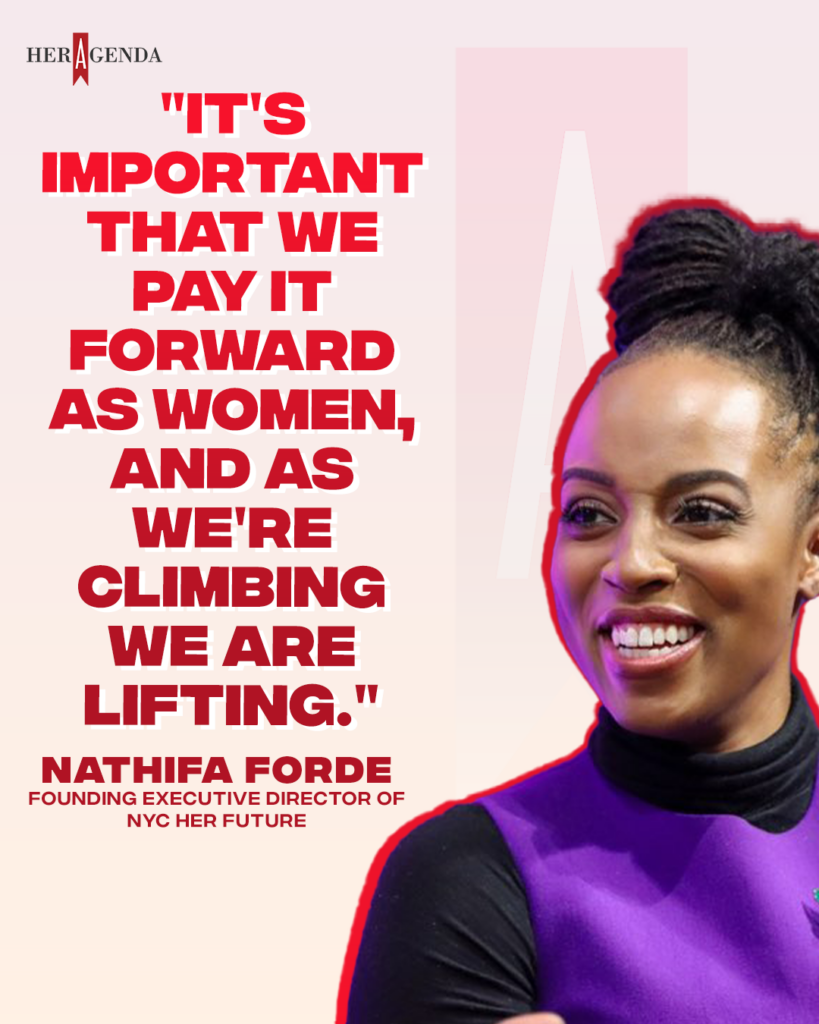
Her Agenda:What would you say are the biggest wins so far?
Nathifa Forde: The biggest successes are the launch of our programs and the creation of the office. This work in this office is a testament to all the other work that has happened over the years. The timing was right, the opportunity was right, and we were able to move forward in that moment and make sure that this [happened].
We have more work to do. We hit all these milestones, and I’m excited about it. I’m excited about the work, but I know we have more work to come. One of the things to come that I’m super excited about is really thinking about our Right to Passage programming that will support our young women and those who identify as such [to understand] it’s a right to pass: a right to go to high school or to have a menstrual cycle. These are conversations and opportunities that I’m excited to have to start making sure that we are funding organizations who have been doing this work for a long time. So a lot to be excited about, but so much more to come.
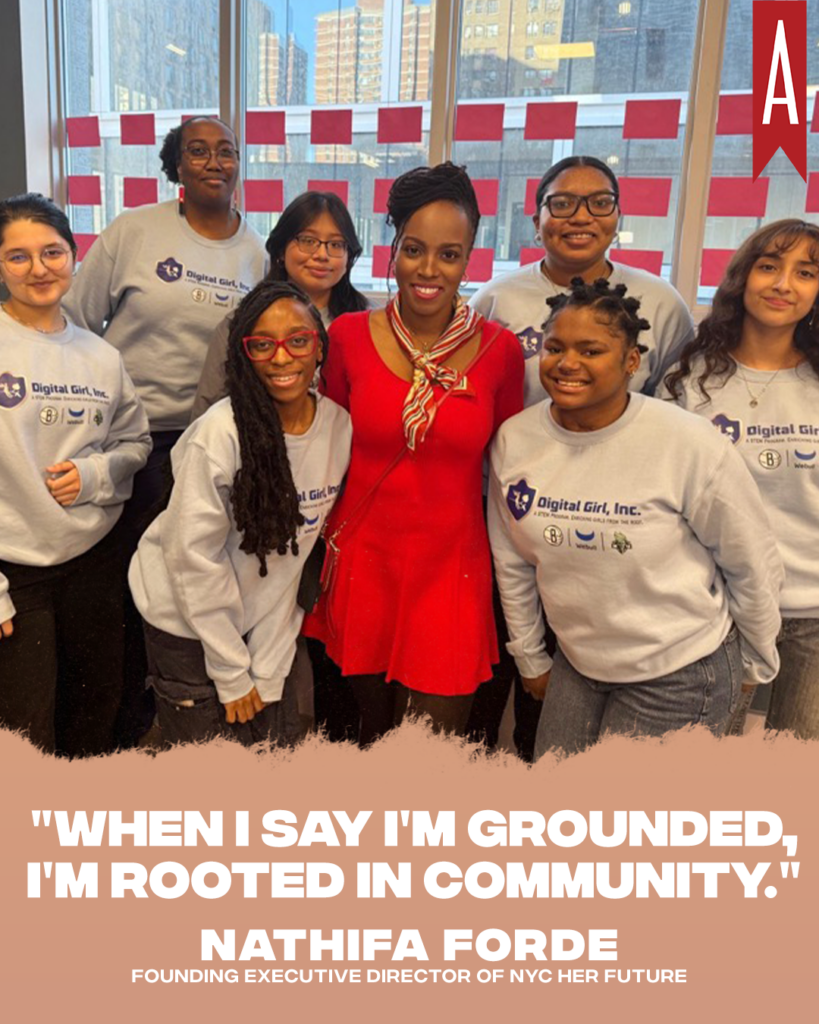
Her Agenda: Workforce development is a big part of your mission. How do you approach economic opportunities for young women of color?
Nathifa Ford: We have credentialing programs and certification programs that we do with CUNY [that focus on] the ability to earn while you’re learning. How powerful is it for you to get a credential in becoming a phlebotomist while you’re in nursing school? [We are] thinking about the resume, thinking about the access, the spaces that they’ll go into. While we’re building our programs, I want to be very intentional. Prior to working with the Young Men’s Initiative, I worked for the Center for Youth Employment for the city. have a strong background in employment, working with what we consider vulnerable or marginalized populations, and making sure that they have the opportunities to access non-traditional jobs. There are so many other opportunities within the healthcare profession that are not clinical that you could tap into. Think about our crisis as it relates to COVID. Exposure is at the core of what we do across a lot of the programs.
At the precipice of everything is this piece of entrepreneurship. Everybody wants to understand how to be an entrepreneur, and we have so many young people who are talented in those ways. So we’re actually in the [process] of launching a program that focuses on young entrepreneurs. I think it’s important, from the lens that I sit at, to understand that [some] young people are not interested in becoming construction workers. They’re not interested in getting their food handler’s license. They’re not interested in getting their security guard license. For us here at NYC Her Future with me at the helm, it’s always going to be looking at non-traditional opportunities.
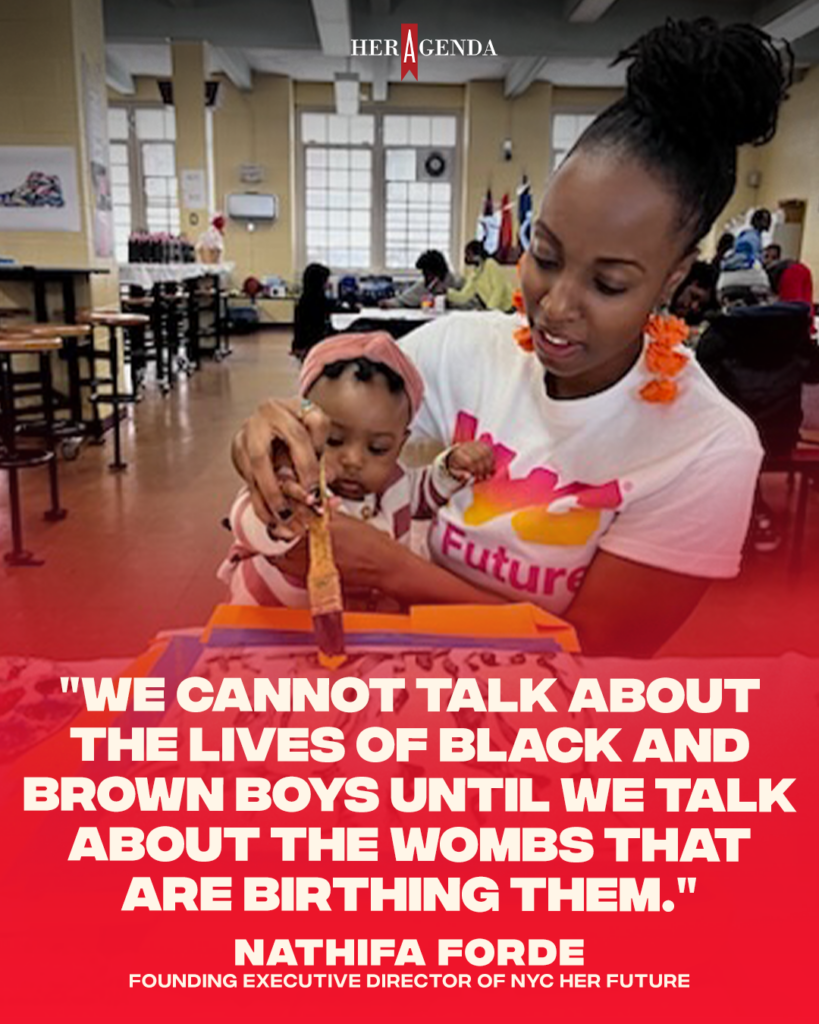
Her Agenda:What role has support and sisterhood played in your journey?
Nathifa Forde: One of the biggest misconceptions that I find in my space when I speak to young people is the [assumption] that they have to do this by themselves. A lot of times, you find women feeling like they have to do this the hard way. One of the things that I think is important to know is that nothing in life do you get to by yourself. At every point in my career, I’ve been mentored. I’ve had people who have championed me, and it’s important that we pay it forward as women, and as we’re climbing we are lifting. This work is not easy, and you have to have your sisterhood to keep you proud, but most importantly, to keep you sane. So always take a moment out to do the thing that you love, to center your joy. I encourage everybody to have mentors, whether it be personally, professionally, or spiritually.
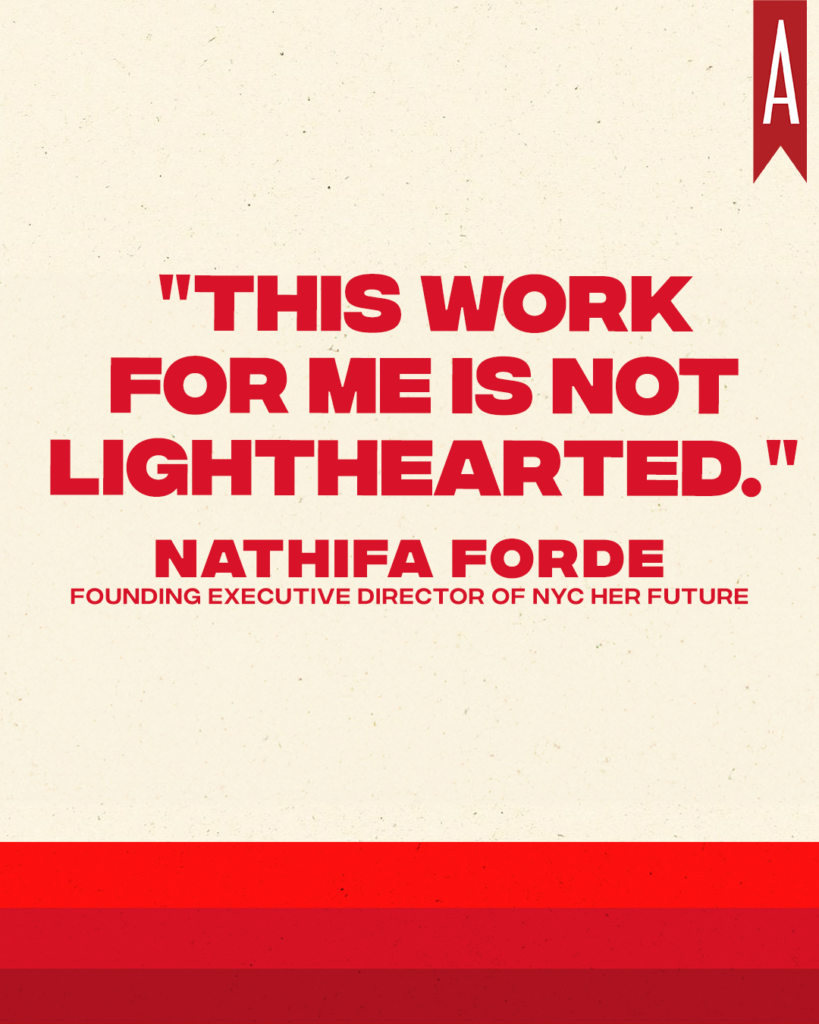
[Editor’s note: This interview has been edited for length and clarity.]

